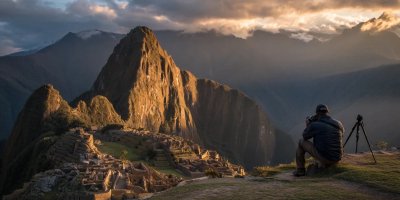
Best Photography Tips for Machu Picchu 2025: Camera Settings & Techniques
Master Machu Picchu photography with expert camera settings, composition techniques, timing tips, and equipment recommendations for stunning shots.
Found 6 results related to this question
Our monitoring service tracks ticket cancellations and new releases 24/7. Get notified instantly when tickets for your preferred dates become available.
Machu Picchu, the iconic Inca citadel perched high in the Andes, offers breathtaking landscapes that are a dream for photographers. To capture its beauty optimally, understanding your camera settings is essential, especially given the varying light conditions throughout the day.
First, consider using a low ISO setting, ideally between 100 and 200, to minimize noise and maintain image quality. During sunrise or sunset, when the light is softer, you might increase the ISO slightly to avoid motion blur while keeping the shutter speed fast.
For landscape photography, a wide aperture (like f/8 to f/16) is recommended. This will ensure a deep depth of field, allowing both the foreground and background to be in focus. A tripod is invaluable here, especially for long exposures, as it stabilizes your camera and allows for sharper images.
Utilizing the bracketing technique can also be beneficial. By taking several shots at different exposures, you can later blend them in post-processing to achieve the perfect balance in highlights and shadows, especially in the dramatic lighting of the Andes.
Make sure to experiment with different compositions as well. The rule of thirds can help create dynamic images. Positioning the ruins off-center while including elements of the landscape can enhance your shots.
Don't forget to use a polarizing filter to reduce glare and enhance the colors of the lush green mountains surrounding the site. This can make your images pop and give them a more vivid feel.
Finally, the golden hour—the hour after sunrise and before sunset—provides some of the best lighting for landscape photography. Arriving early at Machu Picchu will not only help you avoid crowds but will also reward you with stunning light and serene views.
Always be aware of the weather as well; the Andean climate can shift unexpectedly. Having a weather-sealed camera or protective gear for your equipment can save your gear from sudden rain showers.
Lastly, immerse yourself in the culture of the Inca heritage while photographing. Understanding the significance of the locations you are capturing will add depth to your photographs and your experience.

Master Machu Picchu photography with expert camera settings, composition techniques, timing tips, and equipment recommendations for stunning shots.

Complete photography guide for Machu Picchu. Professional tips, best shooting locations, camera settings, lighting conditions, and equipment recommendations for stunning photos.

Complete photography guide for Machu Picchu. Camera settings, best viewpoints, timing, equipment recommendations, and techniques for stunning photos.

Capture Machu Picchu like a pro with our guide to golden hours, top viewpoints and composition tricks, plus gear tips for changing weather.

Weighing up whether to hike Huayna Picchu or Machu Picchu Mountain? This guide compares distances, elevation, difficulty, permits, highlights and tips for both iconic climbs.

Complete guide to Machu Picchu's 4 circuits. Learn which route offers the best views, photo opportunities, and experiences for your visit.
Set up instant alerts for ticket availability and never miss your chance to visit Machu Picchu.
Get Alerts